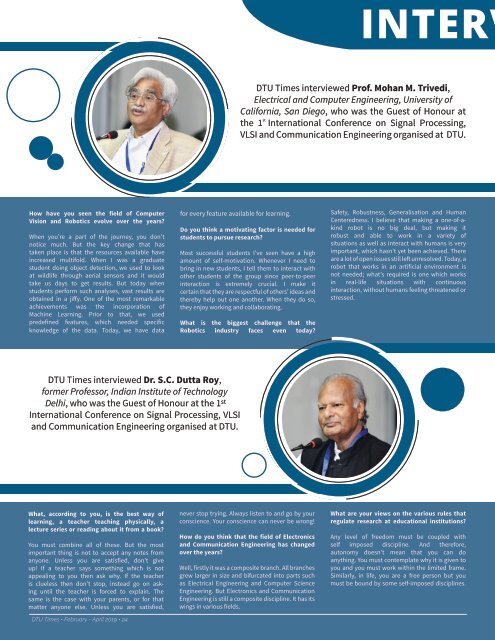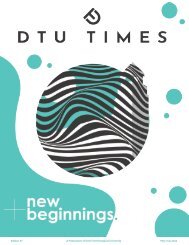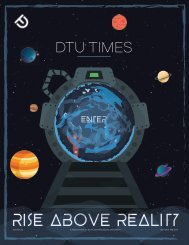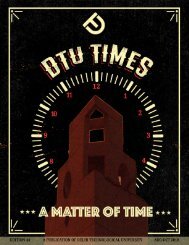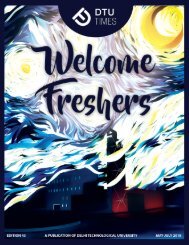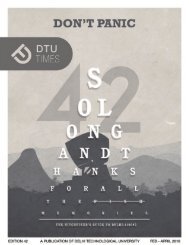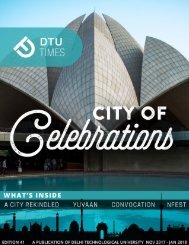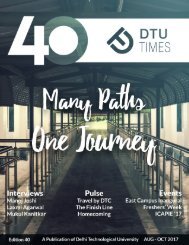Edition 46
Create successful ePaper yourself
Turn your PDF publications into a flip-book with our unique Google optimized e-Paper software.
INTERV<br />
DTU Times interviewed Prof. Mohan M. Trivedi,<br />
Electrical and Computer Engineering, University of<br />
California, San Diego, who was the Guest of Honour at<br />
the 1 st International Conference on Signal Processing,<br />
VLSI and Communication Engineering organised at DTU.<br />
How have you seen the field of Computer<br />
Vision and Robotics evolve over the years?<br />
When you’re a part of the journey, you don’t<br />
notice much. But the key change that has<br />
taken place is that the resources available have<br />
increased multifold. When I was a graduate<br />
student doing object detection, we used to look<br />
at wildlife through aerial sensors and it would<br />
take us days to get results. But today when<br />
students perform such analyses, vast results are<br />
obtained in a jiffy. One of the most remarkable<br />
achievements was the incorporation of<br />
Machine Learning. Prior to that, we used<br />
predefined features, which needed specific<br />
knowledge of the data. Today, we have data<br />
for every feature available for learning.<br />
Do you think a motivating factor is needed for<br />
students to pursue research?<br />
Most successful students I’ve seen have a high<br />
amount of self-motivation. Whenever I need to<br />
bring in new students, I tell them to interact with<br />
other students of the group since peer-to-peer<br />
interaction is extremely crucial. I make it<br />
certain that they are respectful of others’ ideas and<br />
thereby help out one another. When they do so,<br />
they enjoy working and collaborating.<br />
What is the biggest challenge that the<br />
Robotics industry faces even today?<br />
Safety, Robustness, Generalisation and Human<br />
Centeredness. I believe that making a one-of-akind<br />
robot is no big deal, but making it<br />
robust and able to work in a variety of<br />
situations as well as interact with humans is very<br />
important, which hasn’t yet been achieved. There<br />
are a lot of open issues still left unresolved. Today, a<br />
robot that works in an artificial environment is<br />
not needed; what’s required is one which works<br />
in real-life situations with continuous<br />
interaction, without humans feeling threatened or<br />
stressed.<br />
DTU Times interviewed Dr. S.C. Dutta Roy,<br />
former Professor, Indian Institute of Technology<br />
Delhi, who was the Guest of Honour at the 1st<br />
International Conference on Signal Processing, VLSI<br />
and Communication Engineering organised at DTU.<br />
What, according to you, is the best way of<br />
learning, a teacher teaching physically, a<br />
lecture series or reading about it from a book?<br />
You must combine all of these. But the most<br />
important thing is not to accept any notes from<br />
anyone. Unless you are satisfied, don’t give<br />
up! If a teacher says something which is not<br />
appealing to you then ask why. If the teacher<br />
is clueless then don’t stop, instead go on asking<br />
until the teacher is forced to explain. The<br />
same is the case with your parents, or for that<br />
matter anyone else. Unless you are satisfied,<br />
DTU Times • February - April 2019 • 24<br />
never stop trying. Always listen to and go by your<br />
conscience. Your conscience can never be wrong!<br />
How do you think that the field of Electronics<br />
and Communication Engineering has changed<br />
over the years?<br />
Well, firstly it was a composite branch. All branches<br />
grew larger in size and bifurcated into parts such<br />
as Electrical Engineering and Computer Science<br />
Engineering. But Electronics and Communication<br />
Engineering is still a composite discipline. It has its<br />
wings in various fields.<br />
What are your views on the various rules that<br />
regulate research at educational institutions?<br />
Any level of freedom must be coupled with<br />
self imposed discipline. And therefore,<br />
autonomy doesn’t mean that you can do<br />
anything. You must contemplate why it is given to<br />
you and you must work within the limited frame.<br />
Similarly, in life, you are a free person but you<br />
must be bound by some self-imposed disciplines.


